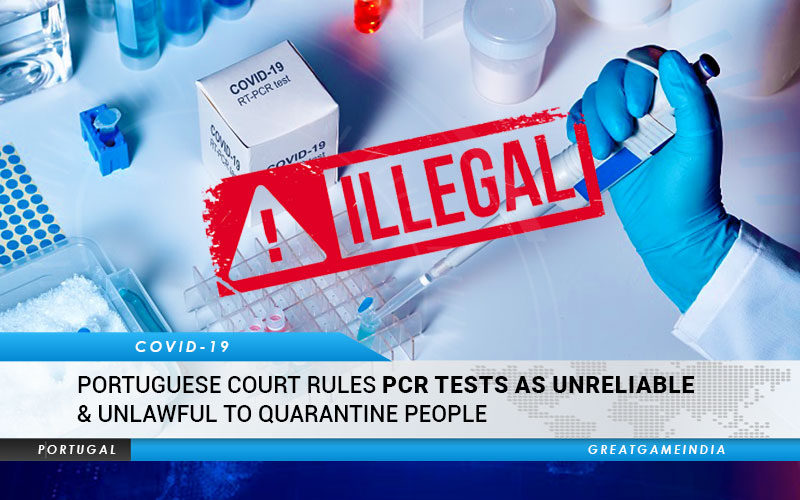A Portuguese appeals court has ruled that PCR tests are unreliable and that it is unlawful to quarantine people based solely on a PCR test.

The court stated, the test’s reliability depends on the number of cycles used and the viral load present. Citing Jaafar et al. 2020, the court concludes that
“if someone is tested by PCR as positive when a threshold of 35 cycles or higher is used (as is the rule in most laboratories in Europe and the US), the probability that said person is infected is less than 3%, and the probability that said result is a false positive is 97%.”
The court further notes that the cycle threshold used for the PCR tests currently being made in Portugal is unknown.
The threshold cycles used in PCR tests in India is between 37 and 40, which makes the reliability of the PCR test less than 3% and the false positive rate as high as 97%.
“if someone is tested by PCR as positive when a threshold of 35 cycles or higher is used (as is the rule in most laboratories in Europe and the US), the probability that said person is infected is less than 3%, and the probability that said result is a false positive is 97%.”
The court further notes that the cycle threshold used for the PCR tests currently being made in Portugal is unknown.
The threshold cycles used in PCR tests in India is between 37 and 40, which makes the reliability of the PCR test less than 3% and the false positive rate as high as 97%.
This case concerned the fact that four people had been quarantined by the Regional Health Authority. Of these, one had tested positive for COVID using a PCR test; the other three were deemed to have undergone a high risk of exposure. Consequently, the Regional Health Authority decided that all four were infectious and a health hazard, which required that they go into isolation.
The court’s summary of the case to rule against the Regional Health Authority’s appeal reads as follows:
“Given how much scientific doubt exists — as voiced by experts, i.e., those who matter — about the reliability of the PCR tests, given the lack of information concerning the tests’ analytical parameters, and in the absence of a physician’s diagnosis supporting the existence of infection or risk, there is no way this court would ever be able to determine whether C was indeed a carrier of the SARS-CoV-2 virus, or whether A, B and D had been at a high risk of exposure to it.”
The court’s summary of the case to rule against the Regional Health Authority’s appeal reads as follows:
“Given how much scientific doubt exists — as voiced by experts, i.e., those who matter — about the reliability of the PCR tests, given the lack of information concerning the tests’ analytical parameters, and in the absence of a physician’s diagnosis supporting the existence of infection or risk, there is no way this court would ever be able to determine whether C was indeed a carrier of the SARS-CoV-2 virus, or whether A, B and D had been at a high risk of exposure to it.”
So if we do a PCR corona test on an immune person, it is not a virus that is detected, but a small shattered part of the viral genome. The test comes back positive for as long as there are tiny shattered parts of the virus left. Correct: Even if the infectious viruses are long dead, a corona test can come back positive, because the PCR method multiplies even a tiny fraction of the viral genetic material enough [to be detected].
Earlier, the WHO’s testing protocol was even questioned by Finland’s national health authority. WHO had called on countries to test as many patients as possible for coronavirus.
Finland ran out of testing capacity and began limiting coronavirus tests to the most vulnerable groups and healthcare personnel only. Finland’s national health authority said that testing people with mild symptoms would be a waste of healthcare resources.
In a startling disclosure, Finland’s head of health security, Mika Salminen dismissed WHO advisory saying the WHO doesn’t understand pandemics and that their Coronavirus testing protocol is illogical and doesn’t work.
So, if the WHO’s testing protocols are indeed based on the most reliable, accurate and well sourced technologies and research methodologies available worldwide, shouldn’t they have known about its negligible effectiveness and its impact in causing panic and chaos? Indeed the WHO knows it doesn’t work and moreover this is not the first time such criticisms have been voiced.
In the past in 2010, the WHO was caught faking a pandemic and was forced to admit that its methodology of measuring the virality or the spread of the disease, instead of its severity was incorrect.
Source…